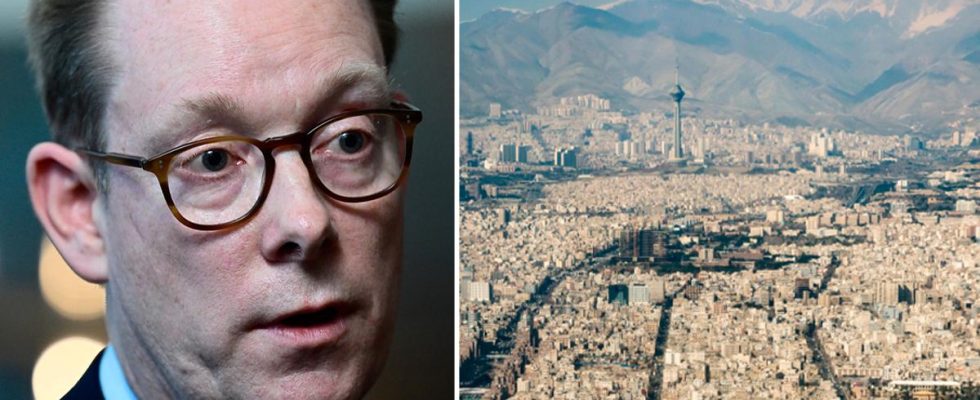unsaveSave
The Swedish government views developments in Iran with concern and highlights the regime’s “nuclear technology actions”.
At the same time, Foreign Minister Tobias Billström is working to bring home the Swedes held in the horror prison Evin.
– As recently as the other day, I had a conversation with my Iranian foreign minister colleague. Then I repeated the demand that Johan Floderus and Ahmadreza Djalali should be released.
Iran poses a threat to Sweden on several fronts, something that became clear when Foreign Minister Tobias Billström (M) read out the government’s foreign declaration for the Riksdag on Wednesday.
He mentioned as an example Iran’s “action in the nuclear field” – that is, the ability to develop nuclear weapons. Earlier this year published New York Times an article in which informed sources stated that within weeks Iran could produce enough uranium to make a nuclear bomb. A finished atomic bomb could be ready within a few years.
Iran is a destabilizing force
This could have disastrous consequences, not least in the Middle East where the situation is already very tense.
– Iran is a destabilizing force in the Middle East and a driving force in several of the conflicts that, in addition to the Gaza-Hamas conflict, also plague the region. For example, support is given to the Hezbollah guerrillas and their attacks from Lebanon against Israel, says Tobias Billström to Aftonbladet.
He also states that Iran’s undermining of human freedoms and rights is a security threat to Sweden.
“For Sweden’s security and stability in the outside world, it is crucial that the rules-based world order, international law and respect for UN statutes are maintained,” the foreign declaration states.
expand-left
full screen Tobias Billström (M) Photo: Jonas Ekströmer/TT / TT Nyhetsbyrån
The demand: Release the Swedes
A clear example of the threat is Iran’s imprisonment of Swedes. Currently, several Swedes are detained, among them Johan Floderus and Ahmadreza Djalali. Both are accused of espionage.
– We naturally demand that they be released, says Billström.
What is the government doing to get them free?
– We are working with intensive diplomacy to ensure that we present our views to the Iranian government. As recently as the other day, I had a conversation with my Iranian foreign minister colleague. Then I repeated the demand that Johan Floderus and Ahmadreza Djalali should be released.
According to several observers, Iran wants to bring about a prisoner exchange. The demand is that Hamid Noury, convicted in Sweden of international law crimes and a suspected key figure in the execution of political prisoners in Iran in the 80s, be released from Swedish prison.
expand-left
full screen Johan Floderus. Photo: Amirabbas Ghasemi / AP
Does not want to comment on prisoner exchange
Recently, voices have been raised that an exchange may be the only possibility to bring the Swedes home. Said Mahmoudi, a professor of international law, recently said the government may be forced to accept a prisoner exchange. Even Peter Pagin, professor emeritus in theoretical philosophy has arguments for such.
Could there be a prisoner exchange?
– I don’t want to speculate about anything in that regard at this point. The important thing for us is to ensure that these people are granted consular access, which they need. That the Swedish bribery can be present in connection with the trials that have been held. Of course, these people must be released so that they can be reunited with their families as soon as possible, says Billström.
A further threat emerged in Ekots revealed that Iranian agents tried to murder Swedish citizens. In his conversation with Iran’s foreign minister, Tobias Billström underlined how seriously Sweden views the data.
expand-left
fullscreenAhmadreza Djalali. Photo: Private / TT News Agency
